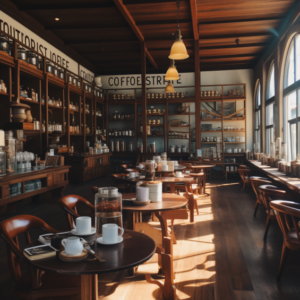Beyond its role as a mere beverage, coffee has become a cultural artifact, influencing and shaping the identities of societies across the globe. This article delves into the complex relationship between caffeine and culture, exploring how coffee has become an integral part of the social fabric, rituals, and traditions that define diverse communities.
Chapter 1: Coffeehouses as Social Hubs
In many societies, coffeehouses transcend their role as places for caffeine consumption, evolving into vibrant social hubs. From the historic coffeehouses of Istanbul to the modern cafés of Paris, these establishments serve as meeting points for intellectuals, artists, and everyday individuals. The café culture fosters intellectual discourse, artistic expression, and a sense of community, shaping the social identity of the societies they inhabit.
Chapter 2: Rituals and Ceremonies
Coffee is not just a morning pick-me-up; it’s a central figure in rituals and ceremonies that define cultural identities. The Ethiopian coffee ceremony, the Japanese art of siphon brewing, and the Middle Eastern preparation of Turkish coffee all contribute to the rich tapestry of global coffee rituals. These ceremonies serve as markers of cultural heritage, creating a sensory experience that connects individuals to their roots.
Chapter 3: Economic Identities
The cultivation and trade of coffee beans have played a pivotal role in shaping the economic identities of various societies. From the coffee plantations of Brazil to the cooperative farming in Ethiopia, coffee has been a driving force in local economies. The global coffee trade has both empowered and challenged communities, influencing their economic structures and relationships with the broader world.
Chapter 4: Coffee and Creativity
Coffeehouses have long been associated with creativity and intellectual pursuits. In societies across the world, from Vienna’s salons to Brooklyn’s artisanal cafés, coffee has fueled the creative spirit. Artists, writers, and musicians often find inspiration in the ambiance of coffeehouses, where the aroma of coffee blends with the hum of creativity, shaping the cultural identity of these communities.
Chapter 5: Social Dynamics in Coffee Cultures
The act of sharing a cup of coffee has profound implications for social dynamics. In cultures where coffee is a symbol of hospitality, such as in Arab traditions, offering a cup of coffee becomes a gesture of warmth and welcome. The social dynamics within coffee cultures reflect shared values, relationships, and the importance of human connections in the fabric of society.
Chapter 6: Coffee as a Catalyst for Change
Coffee has been a catalyst for social and political change throughout history. The coffeehouses of Enlightenment-era Europe were hotbeds for revolutionary ideas, and coffee played a role in social movements such as women’s liberation in the 20th century. The act of coming together over coffee has empowered communities to challenge norms and drive positive transformations.
Chapter 7: Regional Flavor Profiles
The diversity of coffee flavors reflects the agricultural and culinary identities of different regions. The bold and earthy tones of Ethiopian Yirgacheffe, the fruity notes of Colombian beans, and the chocolatey richness of Brazilian coffee—all contribute to the unique flavor profiles that become synonymous with the identity of specific regions. Coffee becomes a medium through which communities express their terroir and distinctiveness.
Chapter 8: Coffee in Religious Practices
In some cultures, coffee has found a place within religious practices and ceremonies. From the Ethiopian Orthodox Church’s use of coffee in religious rituals to the Sufi tradition’s embrace of coffee as a spiritual stimulant, the beverage becomes intertwined with faith and spirituality. Coffee serves as a conduit for communal worship, creating a bond between religious identity and the act of brewing and sharing coffee.
Conclusion: Brewing Identity
As a global beverage with local significance, coffee weaves itself into the very fabric of societal identity. The rituals, social dynamics, economic structures, and creative expressions associated with coffee contribute to the rich mosaic of cultural identities around the world. Beyond its caffeinated kick, coffee serves as a vessel for stories, traditions, and the essence of the communities it touches, forever shaping the cultural landscapes it inhabits.


